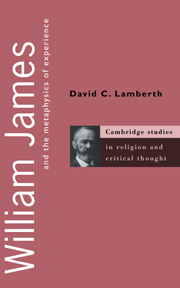Book contents
- Frontmatter
- Contents
- Note on the text
- Acknowledgments
- Introduction
- 1 James's radically empiricist Weltanschauung
- 2 From psychology to religion: pure experience and radical empiricism in the 1890s
- 3 The Varieties of Religious Experience: indications of a philosophy adapted to normal religious needs
- 4 Squaring logic and life: making philosophy intimate in A Pluralistic Universe
- 5 Estimations and anticipations
- Select bibliography
- Index
2 - From psychology to religion: pure experience and radical empiricism in the 1890s
Published online by Cambridge University Press: 22 October 2009
- Frontmatter
- Contents
- Note on the text
- Acknowledgments
- Introduction
- 1 James's radically empiricist Weltanschauung
- 2 From psychology to religion: pure experience and radical empiricism in the 1890s
- 3 The Varieties of Religious Experience: indications of a philosophy adapted to normal religious needs
- 4 Squaring logic and life: making philosophy intimate in A Pluralistic Universe
- 5 Estimations and anticipations
- Select bibliography
- Index
Summary
In the preceding chapter I sought to characterize in some detail James's radically empiricist Weltanschauung, dividing it into components for the purposes of analysis and explication, and treating the overall view and its constituent parts from a systematic perspective. While treating James's views systematically is one of the overall aims of this book, I am also advancing a particular historical argument about the development of his philosophical views: namely, that the bulk of his radically empiricist world-view was formulated during the 1890s rather than the early 1900s. This interpretation is significant in itself for understanding James's thought. It is particularly crucial, however, for my interests in his views on religion, since his primary work between the two time periods in question was his avowed “last will and testament” on religion, The Varieties of Religious Experience. As chapter seeks to offer a fresh interpretation of Varieties in light of James's radical empiricism, in this chapter I intend to establish the basic chronology for the development of the major tenets of James's radically empiricist philosophy, as well as explore certain details of the view as it appears in 1895.
James's turn to philosophy – metaphysics in particular – is often thought to occur later in the decade, coinciding roughly with three quite public events: the publication of The Will to Believe in 1897; James's reappointment as Professor of Philosophy in 1897 (from 1889 to 1896 he was Professor of Psychology); and his delivery of the lecture “Philosophical Conceptions and Practical Results” in 1898 at Berkeley, wherein he publicly introduces his pragmatism.
- Type
- Chapter
- Information
- William James and the Metaphysics of Experience , pp. 61 - 96Publisher: Cambridge University PressPrint publication year: 1999

